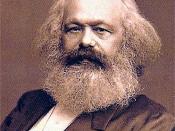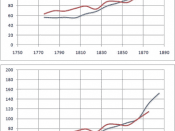The mid-nineteenth century in America is often accurately depicted as a time of technological and industrial advancements. The shift from an agricultural and commercial economy to an industrial one brought with it great social, political, and economic problems that were hitherto unknown to an agricultural economy. One of new political ideologies promising to the poor was socialist movement. It was a direct result of the Industrial Revolution that produced the iniquities and despair of the lower working class and a doctrine based on hard facts.
During 19 century, new machinery of production that developed offered the possibility sharply reducing drudgery and toil and of massively increasing the production of wealth so as to eliminate poverty. In reality, the industrial revolution did no such thing. Many workers found themselves caught in a never-ending cycle of despair brought on by barely-above-starvation wages, which kept them chained to their factory jobs. Friedrich Engels described the miserable working-class districts in Manchester as "deplorable."
He not only described about the living conditions but also emphasized the isolation in big city; "Here indeed, human society has been split into its components atoms (The Condition of the Working Class in England, p.324). Wages were so low for working men that they were often forced to send their wives and children as young as 5-6 years old out to work, as well (Testimony For the Factory Act of 1833, p327). The living conditions in the big cities were barbaric, at best, with overcrowding, disease and epidemics, crime, and prostitution.
Many thinkers, particularly in the middle classes, began to investigate and question the costs of industrialism. The socialists challenged the expansion of capitalism and the dominance of the middle class. One of the most famous, and influential, critiques of capitalism appeared in the Communist Manifesto by Karl Marx (1818-1883)...


